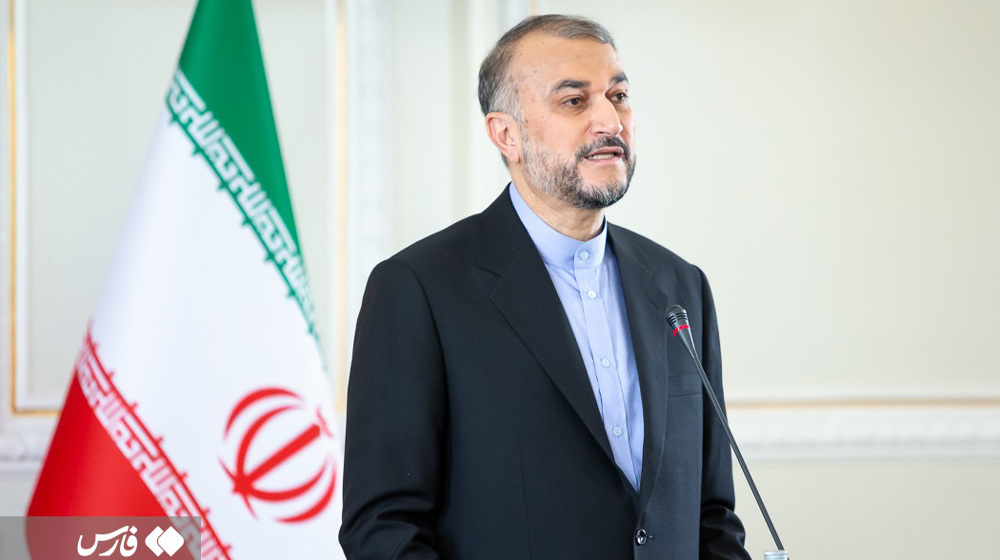Alwaght- Iranian foreign minister said on Sunday the US was “imposing new conditions” for removing its sanctions in order to revive the 2015 nuclear deal, stressing that Tehran would never compromise on its red lines and will seek a “strong” and “durable” agreement.
Hossein Amir-Abdollahian said, "On the issue of lifting sanctions, they (the Americans) are interested in proposing and imposing new conditions outside the negotiations."
“We are definitely looking for the sanctions to be removed, but in a dignified manner and through a strong and lasting agreement. However, Mr. [President Ebrahim] Raeisi has always reminded all cabinet members that not all hopes should be pinned on what would happen in Vienna. All state institutions are rather obliged to work to neutralize sanctions and promote the sustainable development of the country’s economy and trade,” The top Iranian diplomat said.
“We continue to tread the path of diplomacy for achieving a dignified, durable and good agreement, but the Americans bring up new conditions in the field of sanctions removal outside the talks,” he added.
Abdollahian noted, “The Islamic Republic of Iran has naturally stood and will stand by its red lines. The Americans keep talking about the need for direct negotiations, but we have not seen any benefit direct talks with the United States, based on our surveys and the viewpoint that the Americans hold.”
The Iranian foreign minister said the American side has not yet taken any positive steps toward promoting prospects for an accord.
Amir-Abdollahian went on to say that Iran, in response to repeated US calls for negotiations, has called on Americans to present one or two practical and tangible measures before any agreement, and release some of Iran’s assets frozen in foreign banks, for instance, as a gesture of good faith.
“During my visit to Moscow, we agreed with the Russian side that if we reached an agreement in Vienna, Russia would not be an obstacle,” Amir-Abdollahian said.
“We were close to concluding technical discussions with the three European countries, but at the same time, we faced the crisis and the war in Ukraine,” he added.
He underscored that Tehran has demanded neither loans nor money from Americans, but rather asked for the release of its own public assets.
Amir-Abdollahian also questioned US President Joe Biden’s willingness to rejoin the 2015 Iran deal, which is officially called the Joint Comprehensive Plan of Action (JCPOA) and lift sanctions against the Islamic Republic, criticizing the several rounds of sanctions imposed by Washington against Iran over the past few months.
The Iranian foreign minister pointed out that non-paper messages are being exchanged between Tehran and Washington through European Union deputy foreign policy chief Enrique Mora.
“We plainly informed the American side not to stonewall, sabotage and delay the agreement. If our red lines are observed and we see a good, strong and lasting agreement before us, there is no doubt for the Iranian side to remain in the deal and for all parties to return to their commitments under the JCPOA,” Amir-Abdollahian said.
“The path to diplomacy is still open. Of course, the three European countries (Britain, France and Germany) in addition to China and Russia have criticized the latest excessive demands of Americans, which have delayed the conclusion of an agreement. They raise some of the issues in their talks with the American side. They sometimes share our opinion and state that the US approach is inconsistent with the spirit of cooperation being pursued in Vienna talks,” he said.
Negotiations have been held in the Austrian capital since April last year to restore the JCPOA, which was ditched by former US President Donald Trump in May 2018.
In quitting the agreement, Trump introduced what he called the “maximum pressure” campaign to bring Iran to its knees. Tehran maintains that the policy has failed dismally. The Joe Biden administration agrees, yet it has not taken any tangible steps to deliver on its promise of repealing the policy.
In recent months, Iran has cited Washington’s indecisiveness as the reason behind the protraction of the talks, as a number of key issues remain unresolved, ranging from the removal of all post-JCPOA sanctions to the provision of guarantees by the American side that it will not leave the deal again.
The other parties to the talks – Russia, China, France, the UK, and Germany – have also noted that the negotiators are close to finalizing an agreement.
Earlier this month, Iranian Foreign Minister Hossein Amir-Abdollahian told Secretary General of the United Nations Antonio Guterres that the negotiating parties in the Vienna talks are close to reaching a final agreement, adding that the ball is now in US court.



























